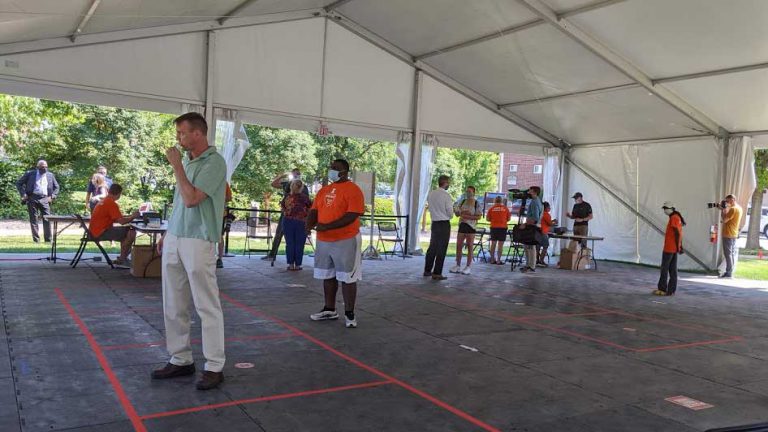SPRINGFIELD – The University of Illinois at Urbana-Champaign still does not have emergency use authorization from the U.S. Food and Drug Administration for its saliva COVID-19 test — and that’s causing delays in expanding it to the rest of the state’s public universities and K-12 schools.
University officials discussed the matter at a hearing hosted by the Illinois Senate’s Higher Education Committee Monday.
The U of I announced in August that it had received EUA from the FDA, but later it recanted that statement when asked by Illinois Newsroom reporters; university officials said they had relied on the advice of a consultant who told them they could achieve EUA status by comparing their test to one created by Yale that had received authorization from the federal government.
At this week’s hearing, state lawmakers asked why it was taking so long to expand access to the test.
“Because in my mind, we’ve waited two months, the thing works,” said Republican State Sen. Chapin Rose. “Why the Hell don’t we have it on the streets?”
University officials confirmed that the test needs either FDA emergency use authorization or an executive order from the governor in order to be used by the majority of the state’s educational institutions. Rose questioned why Gov. J.B. Pritkzer hasn’t issued an executive order allowing the test to be used within the state’s borders.
“Because I’ve got 50 school districts worth of kids that would love to have this available to them. I’m sure every school district in Illinois would love to have this available to them,” Rose said.
U of I System president Tim Killeen said the university had the support of the governor’s administration, but he said setting up the laboratories and supply chains necessary to provide widespread access to the test takes time.
“This is not something you can turn on overnight,” Killeen said. He added that the university is committed to expanding access to its test “but we’re going to go through this in a logical, orderly, appropriate, defensible fashion.”
Bill Jackson, director of the Discovery Partners Institute and head of Shield T3 — a U of I initiative to expand its COVID-19 testing technologies to entities outside the state of Illinois — said FDA authorization is required regardless of an executive order from the governor. He said they have fielded interest in the test from the incoming Biden administration, New Zealand, the Philippines, the United Kingdom and others.
“So, this is bringing validation and global recognition. So, not having EUA doesn’t help us,” Jackson said.
U of I officials said they’re in the final stages of a clinical trial required for FDA authorization of the test.
Ron Watkins, an associate dean at the U of I’s Urbana campus and managing director of its SHIELD team — which is focused on expanding the test to different regions of Illinois — said they’re prepared to offer the test at multiple campuses by the time the spring semester begins.
Those campuses include: Northern Illinois University in Dekalb, Illinois State University in Bloomington, Eastern Illinois University in Charleston, as well as Chicago State and Governors State Universities.
“If Western Illinois [University] wants us to be there on campus, we’ll be there with them in January as well,” Watkins said. “And I need to have some further communications with [Southern Illinois University Edwardsville] and [Southern Illinois University] to see where we’re at.”
Lawmakers also discussed the possibility that the state would use $20 million received through the federal CARES Act legislation to pay for 1 million COVID-19 tests for Illinois’ public universities. Each test costs between $20 and $30 to administer, according to university officials.
Chair of the committee, State Senator Pat McGuire, a Democrat, asked whether the U of I would benefit financially from such an arrangement.
“If by benefit, you mean, you know, generate revenue? No, they would go to support tests and be invoiced appropriately at all those universities — all the public universities,” Killeen said.
Some of that money would be used to pay for testing at the U of I’s campuses, he added.
Lawmakers also applauded the U of I’s accomplishments during the COVID-19 pandemic. Rose asked how much money it would take to provide the test to all public K-12 and university students throughout the state at least until March.
Watkins estimated that would cost about $300 million. Rose said he hoped state lawmakers could pursue funding for such an effort in a bipartisan manner.
“I know sometimes we can ask tough questions, but I don’t want anyone to think that that belies any of the work you guys have done,” Rose said. “It’s pretty amazing. I’m pretty proud of my alma mater. And it’s up to us to help you.”
Lee Gaines is a reporter for Illinois Public Media.
Follow Lee Gaines on Twitter: @LeeVGaines

